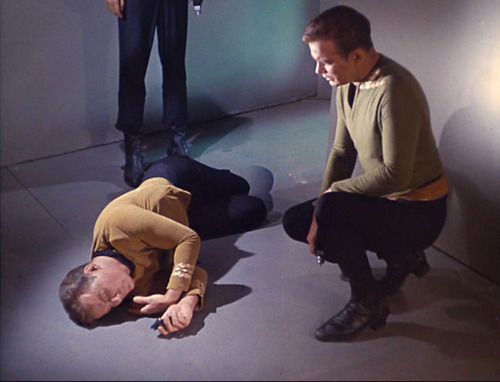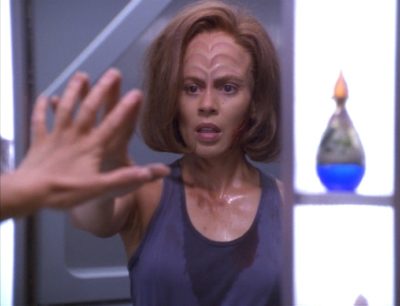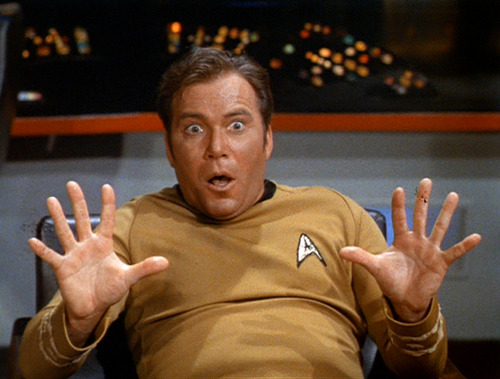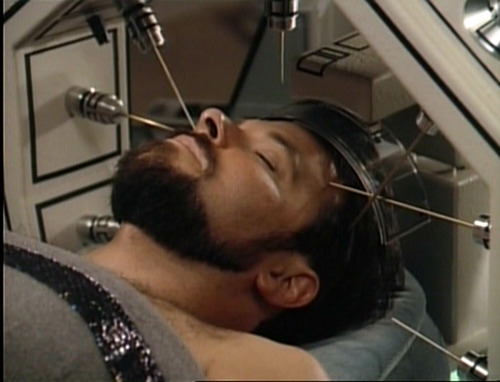This is one of the big episodes we discussed in our recent episode of All Things Trek on men and masculinity in Star Trek, because it’s about the qualities that make a man a leader.
In a transporter accident at the beginning of “The Enemy Within”, Kirk gets split into two, in the vein of Dr. Jekyll and Mr. Hyde. The overall message of the episode is that Kirk needs both sides – his more moral side and his darker side – in order to be a good leader.
For the purposes of this review, I won’t be referring to the two sides as “Good Kirk” and “Evil Kirk”, since I don’t think that’d be totally accurate (more on that later).
Instead, meet “Dry Kirk”:
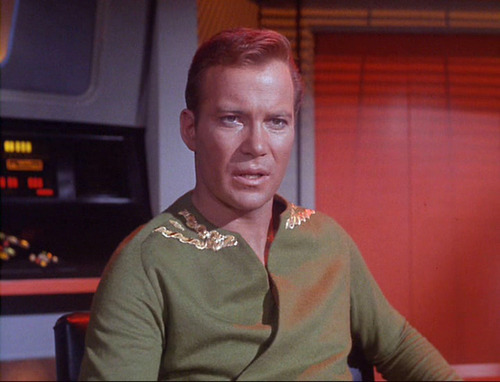
And “Sweaty Kirk”:
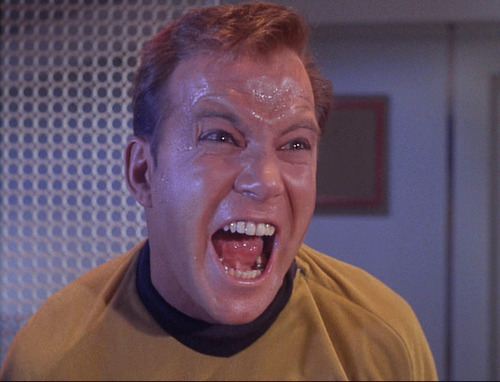
Before I tell you a little more about them and what they say about stereotypes of men and masculinity, I need to note this is also the episode that brought us possibly my personal favourite strange and unfathomable TOS alien lifeform: the unicorn dog:
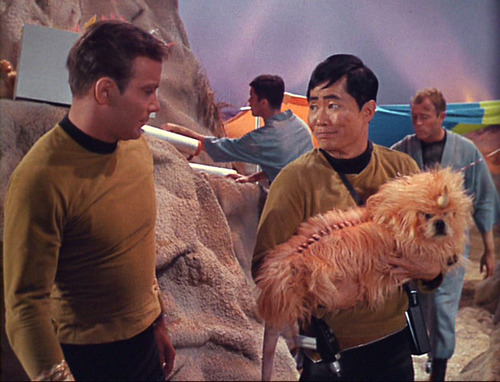
And I feel like the creators were really, really proud of the unicorn dog, because it’s in a boatload of scenes. I think it probably gets more screentime than Sulu. I made this collage so you can appreciate it too.
Ok, now onto more serious matters.
There are two Kirks loose on the ship, but initially nobody notices because the transporter room is empty when Sweaty Kirk materializes, looking maniacal, a few minutes after Dry Kirk has already gone.
Dry Kirk is feeling a bit woozy so he goes back to his quarters, where he finds Rand waiting with some data chips. Meanwhile, Sweaty Kirk heads to Sickbay, where McCoy is treating a crew member who was injured on the planet.
Sweaty Kirk demands saurian brandy and practically throttles McCoy to get it, but he’s probably just having a bad day. Spock should probably just check and make sure he’s ok.
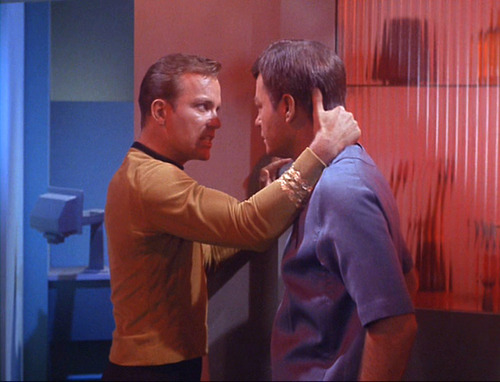
Spock finds Dry Kirk towelling off, and he tells him McCoy must be playing a prank on him; he certainly wasn’t in Sickbay demanding brandy. So so far, here’s what we know: Sweaty Kirk = a violent drunk; Dry Kirk = honest (and sexy).
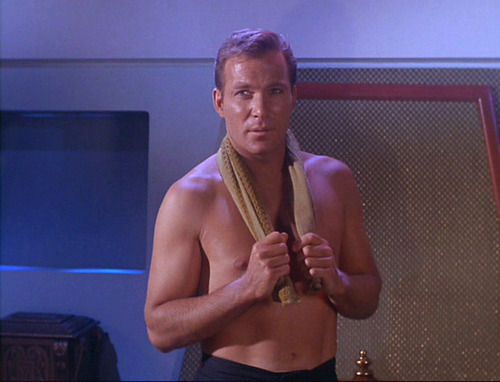
Scotty lets (Dry) Kirk know about a strange event – the unicorn dog has a duplicate that materialized after it. And it’s actually more an opposite than a duplicate: savage and ferocious. And you think that this would be enough info, with the report from Dr. McCoy, for them to start figuring shit out, but apparently not.
[Trigger Warning: attempted rape]

The next scene is truly disturbing, as Sweaty Kirk – actually I’m cool calling him Evil Kirk at this point – attempts to rape Janice Rand. When she lets him into her quarters, she of course doesn’t know it’s not normal Kirk.
Kirk: You’re too beautiful to ignore. Too much woman. We’ve both been pretending too long. (grabs her) Stop pretending. Let’s stop pretending. Come here, Janice. Don’t fight me. Don’t fight me, Janice. (kisses her)
Rand: Captain!
Kirk: Just a minute, Janice. Just a minute!
Kirk forces Janice to the ground and she scratches his face and runs for the door, with Kirk trying to grab her from behind. She sees a crewman in the corridor and shouts for him to get Mr. Spock. Evil Kirk flees.
So here’s the scene that mainly explains why I don’t think “Good Kirk” is accurate. When Dry Kirk hears he’s accused of attacking Rand, he totally disbelieves it and goes to Sickbay to question her. And Spock and McCoy let him, even though it’s totally inappropriate. Not believing her is bad enough, but when the crewman, Fisher, corroborates her story, Kirk gets angry at him.
Grace Lee Whitney does a fabulous job acting in this second really disturbing scene where Rand is clearly traumatized and conflicted.
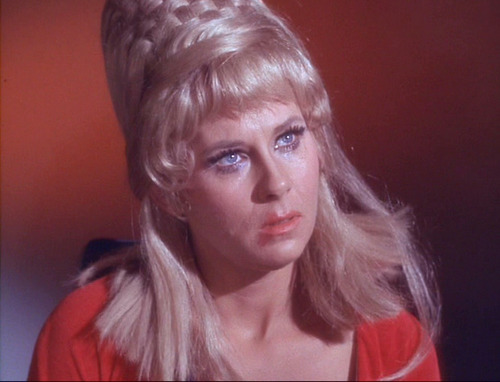
Kirk: Yeoman. I was in my room. It wasn’t me.
Rand: Sir, Fisher saw you, too.
Kirk: Fisher saw?
Rand: If it hadn’t been. I can understand. I don’t want to get you into trouble. I wouldn’t have even mentioned it!
Kirk: It wasn’t me!
Fisher: It was you, sir.
Kirk: Do you know what you’re saying?
Fisher: Yes, I know what I’m saying.
Spock is the one who realizes there’s an impostor aboard, but he doesn’t say anything until he’s sent Janice back to her quarters, because that seems smart to just send her home without even someone to be close by if she needs help.
At this point we know: Sweaty Kirk = violent, drunkard, rapist; Dry Kirk = self-centred, kind of a jerk.
Spock and Kirk go to talk to Scotty about the situation and decide to send out search parties for the impostor Kirk. Dry Kirk is starting to get a bit indecisive and Spock exhorts him to not tell the crew the truth about the situation lest he be perceived as weak.
Spock: Captain, no disrespect intended, but you must surely realize you can’t announce the full truth to the crew. You’re the Captain of this ship. You haven’t the right to be vulnerable in the eyes of the crew. You can’t afford the luxury of being anything less than perfect. If you do, they lose faith, and you lose command.
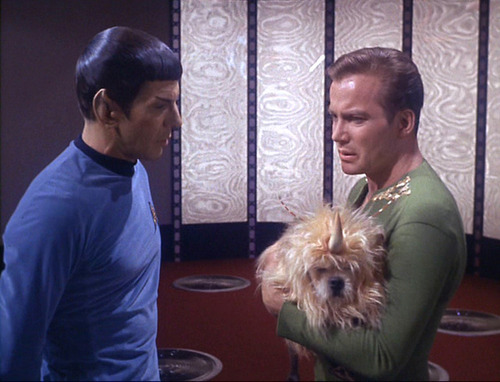
It’s time to look at the three really bad messages in this episode:
Spock’s comment says leaders aren’t allowed to show weakness, and it plays into a damaging narrative that “real men” don’t show “weakness” (often meaning not allowed to express normal emotion or admit they need help, as Dry Kirk clearly does).
The other really problematic thing this episode says is the dark side of Kirk is the side that keeps him strong, that helps him make decisions, that gets him respect – that makes him a good masculine leader. From this point in the episode, Dry Kirk gets more and more indecisive (he’s supposed to be figuring out how to rescue the others left on the quickly freezing planet) and it’s made clear both sides need to be reintegrated to be a good leader.
It’s a disturbing message, because you just showed that same dark side trying to rape his female subordinate, and the side that’s supposedly more moral being more concerned about himself than her after she’s attacked.
A bit later, after Sweaty Kirk is captured and they’re trying to figure out how to reintegrate the two, Spock expostulates more on this idea that the negative side is necessary. In his comments, it’s also implied that the traits we’ve seen in Sweaty Kirk (including his desire to rape, which Spock refers to as “lust”) – that Kirk’s “negative side traits” are natural for human men.
Spock: We have here an unusual opportunity to appraise the human mind, or to examine, in Earth terms, the roles of good and evil in a man. His negative side, which you call hostility, lust, violence, and his positive side, which Earth people express as compassion, love, tenderness…and what is it that makes one man an exceptional leader? We see indications that it’s his negative side which makes him strong, that his evil side, if you will, properly controlled and disciplined, is vital to his strength. Your negative side removed from you, the power of command begins to elude you.
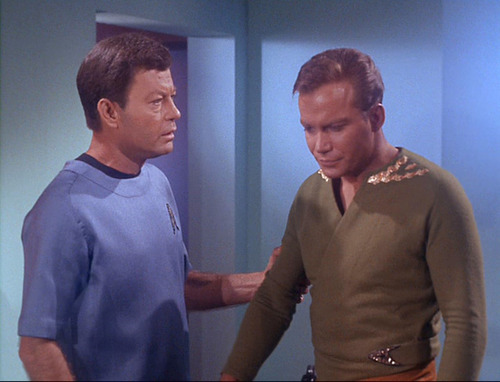
McCoy hits the point home further when he adds: “Jim, you’re no different than anyone else. We all have our darker side. We need it! It’s half of what we are. It’s not really ugly, it’s human.” This plays into the idea that “boys will be boys” – that men have less responsibility to respect women as equals because there’s a natural part of them that will always be thinking about sex. This underestimates men and undermines women.
As Dry Kirk is dithering (and McCoy and Spock remain totally committed to letting him kill the guys on the planet rather than exposing his secret), Sweaty Kirk attacks him and tries to take over the ship, but not before he runs into Janice (who is back at work ridiculously quickly) and tells her he wants to explain. He say his “animal side” took over and he’d like to come to her quarters later to talk about it.
But Sweaty Kirk only takes control of the bridge briefly before Dry Kirk, Spock and McCoy come and force him down to the transporter room, where the two Kirks are reintegrated.
The last scene, though, actually makes the whole Kirk/Rand situation worse. First, they have her try to apologize to Kirk (for?): “The impostor told me what happened, who he really was, and I’d just like to say that. Well, sir, what I’d like is…”
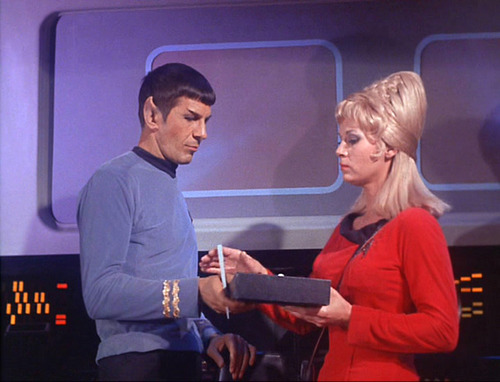
And then Spock insinuates that she was secretly into the Kirk that tried to rape her: “The, er, impostor had some interesting qualities, wouldn’t you say, Yeoman?”
It’s almost like they were going for that as a joke, and it’s just awful.
I think you could make a case that “The Enemy Within” is one of the worst-handled depictions of sexual assault in Trek (see my review of “Fusion” for more on how stories about rape can be handled better). Rand is attacked, disbelieved, sent back to work with no concern for her potential recovery needs, and then she’s the one who ends up apologizing and being told she secretly wanted it.
And clearly the messages about masculinity aren’t great, either.
Bechdel-Wallace Test: Fail







